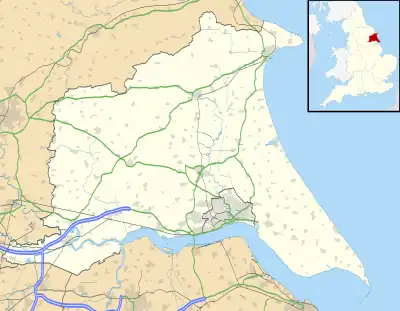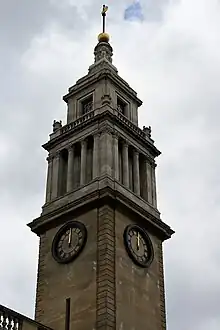Guildhall, Kingston upon Hull
The Guildhall is a building on Alfred Gelder Street in the City of Kingston upon Hull, East Riding of Yorkshire, England. The building is currently the headquarters of Hull City Council but is also used as a venue for conferences, civic receptions and formal dinners. It is a Grade II* listed building status.[1]
| Guildhall, Kingston upon Hull | |
|---|---|
.jpg.webp) The Lowgate frontage | |
| Location | Kingston upon Hull, East Riding of Yorkshire |
| Coordinates | 53.74443°N 0.33328°W |
| Built | 1914 |
| Architect | Sir Edwin Cooper |
Listed Building – Grade II* | |
| Designated | 12 November 1973 |
| Reference no. | 1279708 |
 Location of Guildhall, Kingston upon Hull in the East Riding of Yorkshire | |
History


A guildhall, which was located at the southern end of Market Place, was first mentioned when it hosted business between the Mayor and Aldermen in 1333.[2] A second guildhall, at a height of two-storeys was built to the north of the first building during the 1630s.[2] This guildhall was demolished to make way for Queen Street in 1805.[2] The mayor then worked from a domestic property in Lower Street, which was first leased and then acquired, until a third guildhall was built to the designs of Cuthbert Brodrick in the Renaissance style on Alfred Gelder Street between 1862 and 1866.[2][3]
The current guildhall, which was designed by Sir Edwin Cooper to accommodate the civic offices and law courts, was built by Quibell, Son & Green of Hull between 1906 and 1914.[4] The eastern end of the current guildhall lies on the site of Brodrick's guildhall.[2] The main frontage on Alfred Gelder Street was built with a central feature flanked by two long colonnades with pavilions at either end.[2] Large sculptures by Albert Hodge, one of a female figure on a boat drawn by seahorses and the other of a figure in a chariot flanked by lions, were placed on each of the pavilions.[2] A turret clock built by Cooke and Johnson of Hull (dated 1865) was transferred from Brodrick's guildhall to the new building.[1]
A time ball, a mechanism which enables navigators aboard ships to verify the setting of their marine chronometers, was installed at the top of the clock tower when it was built.[5] The guildhall time ball is believed to be the last to have been installed in the UK and also the highest to have been installed the UK.[6] The building was damaged in bombing in May 1941 during the Hull Blitz of the Second World War.[7][8]
The western end of the structure continued to serve as the location of the law courts for the city,[9] until they moved to the new Kingston upon Hull Combined Court Centre in Lowgate in 1991.[10]
A 23-bell carillon was added to the bell tower, which is 41 metres (135 ft) high,[11] in 2004 and mechanised winding equipment for the clock was installed in 2013.[12]
In 2016, the council launched an appeal seeking funds from the Heritage Lottery Fund and other donors to enable it to raise sufficient funds to restore the time ball.[6] In October 2018 the Heritage Lottery Fund announced a contribution of £281,100 to the council's appeal.[13] The restored time ball, coated in 23.5 carat gold leaf and weighing 50 kilograms (110 lb), was reinstalled on top of the clock tower in September 2021,[14] and following renovation work on the Guildhall clock tower as well as the installation of a ship-shaped weather vane on top of the ball's pole, the restored time ball first dropped on 29 June 2023, the first time since its mechanism was removed in 1922.[15][16]
Inside the Guildhall
The main entrance to The Guildhall is from Lowgate. Inside the main entrance is the Grand Staircase, which sweeps up to the Civic Suite, Reception Room and Banqueting Hall. At the foot of the staircase is a statue of King Edward I, who granted the city's first charter in 1299.[17] Works of art include a tapestry depicting 700 years of civic history[18] and a painting by Terence Cuneo depicting the Departure of Queen Elizabeth II and the Duke of Edinburgh from the Corporation Pier, Kingston upon Hull, for a State Visit to Denmark.[19]
References
- Historic England. "Guildhall (1279708)". National Heritage List for England. Retrieved 14 August 2013.
- Allison, K. J. (1969). "'Civic institutions', in A History of the County of York East Riding: Volume 1, the City of Kingston Upon Hull". London: British History Online. pp. 433–443. Retrieved 26 August 2019.
- The British Almanack. Vol. 40. Knight and Company. 1867. p. 168.
- "Hull Guildhall Collection and the Hull Tapestry". Culture 24. Retrieved 8 April 2020.
- "Report number: 16/2017". Historic England. Retrieved 8 April 2020.
- "Guildhall Greenwich Time Ball". Hull City Plan. Retrieved 29 July 2020.
- Guildhall Tour Guide. Hull, England: Hull City Council. 2001. p. 1.
- "The air raids on Hull on the nights of 7/8 May and 8/9 May 1941". North East Diary. Retrieved 29 July 2020.
- Morley, Ian (1 May 2001). "Examples of Provincial Civic Design in Britain, circa 1880 to 1914" (PDF). University of Sheffield. p. 342. Retrieved 9 February 2023.
- Mulcahy, Linda; Rowden, Emma (2019). The Democratic Courthouse: A Modern History of Design, Due Process and Dignity. Taylor and Francis. ISBN 978-0429558689.
- "Guildhall, Kingston upon Hull". Emporis. Retrieved 8 April 2020.
- "Guildhall tower clock no longer needs a helping hand". NPS Group. 1 May 2013. Archived from the original on 30 April 2017. Retrieved 8 April 2020.
- "Hull's Greenwich Time Ball to rise again". Heritage Lottery Fund. 18 October 2018. Retrieved 29 July 2020.
- Rane, Aditi (1 September 2021). "Moment huge time ball hoisted back to Hull skyline". Hull Daily Mail. Retrieved 29 June 2023.
- Harrat, Stuart (29 June 2023). "Hull's gold time ball drops again after 100 years". BBC News. Retrieved 29 June 2023.
- Bowman, Jack (29 June 2023). "Watch the moment Hull's historic Time Ball dropped for the first time in a century". Hull Daily Mail. Retrieved 29 June 2023.
- "September 8th". Hull and East Yorkshire History. Retrieved 28 July 2020.
- "The Guildhall". Humber Museums. Retrieved 28 July 2020.
- Cuneo, Terence Tenison. "The Departure of HM Queen Elizabeth II and HRH the Duke of Edinburgh from the Corporation Pier, Kingston upon Hull, for the State Visit to Denmark". Art.uk. Retrieved 28 July 2020.
External links
- Historic England. "Details from listed building database (1279708)". National Heritage List for England.
- Guildhall, Hull - tour and collections information